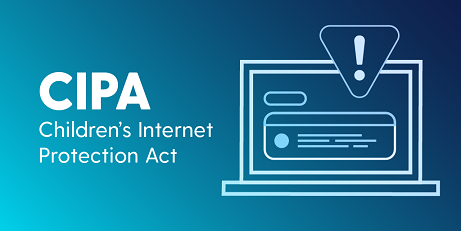CIPA Compliance
Congress enacted the Children's Internet Protection Act (CIPA) in 2000 to address issues relating to minors' access to harmful or obscene content via the Internet. CIPA compliance is mandatory to libraries and schools that leverage the E-Rate program to get discounts for Internet connections or access. These organizations are mandated to provide a safe environment for kids when they go online.

What Does CIPA Compliance Mean?
A school or library won't be eligible for Internet connection discounts offered via the E-Rate program unless it proves that technology protection measures and Internet-safe policies are in place. By becoming CIPA-compliant, schools and libraries get empowered to take control of their networks. The protection measures that the institutions ought to take include blocking or filtering Internet access to potentially harmful content such as child pornography.
There also needs to be a policy that prevents the unauthorized disclosure of minors’ personal information. Likewise, libraries and schools ought to prove that they are creating awareness about appropriate online behavior when minors interact with other Internet users. Minors also need to get educated about the hazards of cyber bullying, hacking activities, and other dangers that lurk on the Internet.
Libraries and schools that are subject to CIPA compliance also need to implement a policy for monitoring the online activities of minors. It’s also mandatory to have a policy for ensuring minors’ safety when using chat rooms, electronic mail, and other forms of electronic communications. Before a school or library enacts these policies, it must hold more than one public gathering with stakeholders to discuss the policy. Adequate notice about such meetings should be given to the public.
CIPA Compliance: What are the Exceptions?
CIPA doesn’t apply to libraries and schools that only receive discounts for telecommunication services. Similarly, the regulation doesn’t authorize the monitoring of Internet use by either minors or adults. Authorized individuals can also disable the filtering or blocking measure during the use of Internet resources to conduct research or for any other lawful purpose.
The role of state and local authorities as far as CIPA compliance checklist is concerned is determining what content is inappropriate or appropriate for minors. Furthermore, CIPA doesn’t have a provision for the blocking of social media sites such as Facebook altogether. Nonetheless, isolated cases of mature or objectionable content ought to be filtered out.
CIPA Compliance and Updated Requirements
In 2011, the Federal Communications Commission issued an order that updated CIPA requirements. The new CIPA guidelines imposed additional requirements for libraries and schools that receive E-rate discounts. Owing to the complexity of risks that minors face when online today, there was a need to update CIPA requirements to ensure more protection to minors.
The updated requirements not only protect minors from malicious Internet users but also focuses on educating them about proper interaction with other users, especially on social media sites. Minors also need to get educated about interactions with other users in chatrooms and how to handle cyberbullying.
How NuEduSEC Can Help with CIPA Compliance?
Libraries and schools must ensure that learners are kept safe when using Internet resources. However, this is a tall order considering the high number of devices connected to their networks. NuEduSEC offers an array of solutions designed to ease the CIPA compliance efforts of schools and libraries. With these solutions, it will be easier for schools and libraries to monitor their networks and filter web traffic for harmful content.
To guarantee the online safety of students, NuEduSEC’s CIPA compliant solutions protect learners both in the classroom and at home. Libraries and schools can conveniently deploy NuEduSEC across their networks to protect devices and users. K12 schools that want to become CIPA compliant can leverage NuEduSEC’s cloud-based platform to ensure on-premised security at a low cost.
Schools and libraries are required to create awareness about responsible Internet use. NuEduSEC helps the institutions to implement such programs. Online activity audits are regularly undertaken to flag and prevent bothersome online activities among students. A web-based classroom management platform helps enforce internet usage guidelines to ensure the safety and privacy of learners. To ensure that learners’ online activities get monitored in real-time, NuEduSEC has a threat protection mechanism against cyberthreats.
Similarly, a cloud-based web filtering tool helps school and library managers to protect learners from online threats. In the coming years, NuEduSEC plans to roll out a threat protection system that gives the management full visibility over the online activity of students and staff. A parental control program is also in the works. It will enable parents to monitor their kids’ online activity in real-time. With such solutions, it will be easier for schools and libraries to gain CIPA compliance certification.